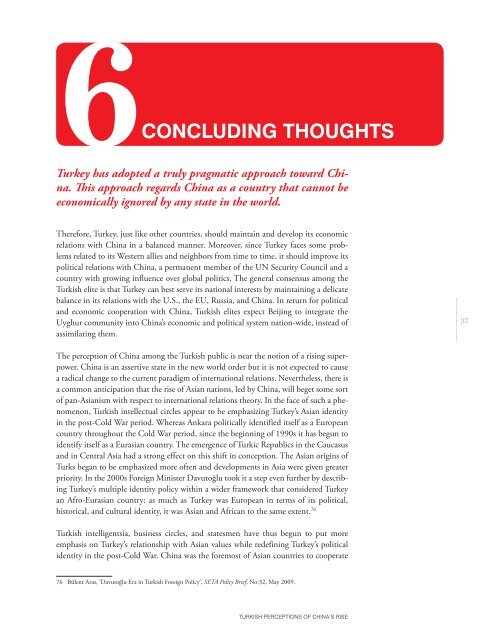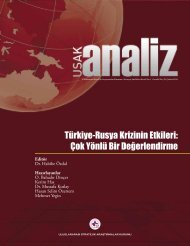Create successful ePaper yourself
Turn your PDF publications into a flip-book with our unique Google optimized e-Paper software.
CONCLUDING THOUGHTS<br />
6Turkey has adopted a truly pragmatic approach toward China.<br />
This approach regards China as a country that cannot be<br />
economically ignored by any state in the world.<br />
Therefore, Turkey, just like other countries, should maintain and develop its economic<br />
relations with China in a balanced manner. Moreover, since Turkey faces some problems<br />
related to its Western allies and neighbors from time to time, it should improve its<br />
political relations with China, a permanent member of the UN Security Council and a<br />
country with growing influence over global politics. The general consensus among the<br />
Turkish elite is that Turkey can best serve its national interests by maintaining a delicate<br />
balance in its relations with the U.S., the EU, Russia, and China. In return for political<br />
and economic cooperation with China, Turkish elites expect Beijing to integrate the<br />
Uyghur community into China’s economic and political system nation-wide, instead of<br />
assimilating them.<br />
37<br />
The perception of China among the Turkish public is near the notion of a rising superpower.<br />
China is an assertive state in the new world order but it is not expected to cause<br />
a radical change to the current paradigm of international relations. Nevertheless, there is<br />
a common anticipation that the rise of Asian nations, led by China, will beget some sort<br />
of pan-Asianism with respect to international relations theory. In the face of such a phenomenon,<br />
Turkish intellectual circles appear to be emphasizing Turkey’s Asian identity<br />
in the post-Cold War period. Whereas Ankara politically identified itself as a European<br />
country throughout the Cold War period, since the beginning of 1990s it has begun to<br />
identify itself as a Eurasian country. The emergence of Turkic Republics in the Caucasus<br />
and in Central Asia had a strong effect on this shift in conception. The Asian origins of<br />
Turks began to be emphasized more often and developments in Asia were given greater<br />
priority. In the 2000s Foreign Minister Davutoğlu took it a step even further by describing<br />
Turkey’s multiple identity policy within a wider framework that considered Turkey<br />
an Afro-Eurasian country: as much as Turkey was European in terms of its political,<br />
historical, and cultural identity, it was Asian and African to the same extent. 76<br />
Turkish intelligentsia, business circles, and statesmen have thus begun to put more<br />
emphasis on Turkey’s relationship with Asian values while redefining Turkey’s political<br />
identity in the post-Cold War. China was the foremost of Asian countries to cooperate<br />
76 Bülent Aras, ‘Davutoğlu Era in Turkish Foreign Policy’, SETA Policy Brief, No:32, May 2009.<br />
TURKISH PERCEPTIONS OF CHINA’S RISE



